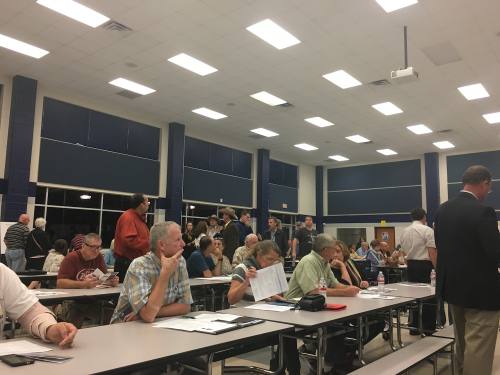"Historically, the primary source of water in Montgomery County has been groundwater, far and away, and very little surface water," Oliver said. "The question is, 'Do we continue to rely on groundwater as our sole source to meet future needs?' ... Or do we try to manage it more sustainably?'"—Wade Oliver, a senior hydrogeologist with INTERA"Essentially, there is still the same amount of water in the ground today that there was in 1845," Harden said. "After 100 years [of] groundwater use, we really haven’t depleted the storage so to speak. These changes in water levels are just a reflection of the amount of water being produced, [they are] not really reflective of the amount of water in the system." However, officials with the LSGCD and SJRA disagree that levels have remained unchanged. Wade Oliver, a senior hydrogeologist with INTERA, a Texas-based geoscience and engineering firm, said due to population growth the levels have experienced as much decline in the last 15 years than in the last 50 years. "To say that these pressures don’t matter is where we disagree," Oliver said. He said as pressure in the aquifer declines utility providers have to work harder to yield the same amount of water production, leading to increased costs. "Historically, the primary source of water in Montgomery County has been groundwater, far and away, and very little surface water," Oliver said. "The question is, 'do we continue to rely on groundwater as our sole source to meet future needs that [will be] 2-2.5 times what we need today?' Considering the problems that water providers have been having, do we try to manage it more sustainably? The [LSGCD] chose to manage it sustainably." The night's program was concluded with remarks from Bell, who said there would be no easy solution for either side of the issue. "We all recognize that without water we don't exist, and in Texas it's a huge property rights issue," Bell said. "We recognize the challenges that everyone finds themselves in in regards to the contract, and certainly water is going to cost more and more as we go forward. The question is not, 'Do we have enough water?' The question is, 'How do we access that water and what the responsible use for that water?' and I think that's why we're all here today." Bell said because water providers and cities often pass fees directly to residents, he believes the best recourse now is for residents to try and fight the fees by talking with local water providers and contacting their elected officials before the next Legislative session. He said he also expects a bill to be filed in the Legislature to convert the LSGCD Board of Directors into elected positions. "I believe water is a huge issue and it's one that we've got to get the answers to figured out and make sure in the process we keep in mind private property rights," Bell said. "We have some work to do, so I challenge those in this room to get this thing done, get it fixed and move forward as a strong Montgomery County."
Select your community
Become an InCIder
News
- Austin Metro
-
Houston Metro
- Houston Metro Home
- Bay Area
- Bellaire | Meyerland | West University
- Conroe | Montgomery
- Cy-Fair | Jersey Village
- Cypress
- Heights | River Oaks | Montrose
- Katy | Fulshear
- Lake Houston | Humble | Kingwood
- New Caney | Porter
- Pearland | Friendswood | Manvel
- Spring | Klein
- Sugar Land | Missouri City
- The Woodlands
- Tomball | Magnolia
- Dallas | Fort Worth Metro
- San Antonio Metro





